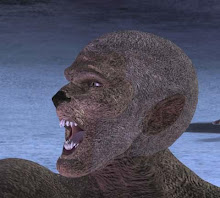History Channel - Original Air Date: November 5, 2008
Thousands of remote islands dot the western Pacific Ocean; do ancient dragon-like reptiles still live here? Aboriginal cave paintings in Australia seem to show lizards larger than men. Do these giant goanna (monitor) lizards -- Megalania -- exist today? Cryptozoologist Rex Gilroy believes they lived as recently as 1890, when such a creature reportedly attacked Australian livestock. Other sightings are more recent, and though scientists are skeptical, Gilroy has plaster casts of footprints. He also claims to have found massive lizard like tracks in the forest in January 2008. The tracks are 12-inches across, and MQ will have them analyzed by a reknowned paleontologist. An MQ team tromps out into the outback forest to search for evidence of the beast. Images of dragons are as old as mankind, but whether they were combinations of existing animals or, perhaps, based on fossils discovered by ancient peoples remains open to debate. But could something like Megalania still live today, 40,000 years after the giants' supposed extinction? How big a population would be needed to maintain the species? Though monitors can reproduce by parthenogenesis (without male fertilization), it seems unlikely that could mantian the species for long (as -- oddly -- females cannot be created this way).
The komodo dragon is the world's largest monitor lizard, and it lives in Indonesia. The largest, though, are still only ten feet long -- merely a third the size of Megalania. One expert says dragons can mutate quickly, over the course of only three generations, so a giant mutation might be possible. In any case, the dragons can be dangerous to humans. In 2007, an eight-year-old boy was attacked by a komodo dragon; he died before he could get medical attention. Swedish divers also had to fight off a dragon in the same year. A 20-footer would be much more dangerous. And most komodos have deadly bacteria in their saliva. Despite this, a team of researchers wrestles with several large komodos in the same way that Steve Erwin uset to wrestle crocodiles. In the outback, camera traps are set to try and find the mythical creature. But only ravens take the bait. And the plaster print looks too symetrical for the paleontologist; a fake, perhaps? As usual on MonsterQuest, "The chase goes on."
Friday, November 7, 2008
Subscribe to:
Post Comments (Atom)





No comments:
Post a Comment